Various Works Read online
Page 26
then we can no longer say that it is nature's work: for if anything is
of a certain character naturally, it either is so invariably and is
not sometimes of this and sometimes of another character (e.g. fire,
which travels upwards naturally, does not sometimes do so and
sometimes not) or there is a ratio in the variation. It would be
better, therefore, to say with Empedocles and any one else who may
have maintained such a theory as his that the universe is
alternately at rest and in motion: for in a system of this kind we
have at once a certain order. But even here the holder of the theory
ought not only to assert the fact: he ought to explain the cause of
it: i.e. he should not make any mere assumption or lay down any
gratuitous axiom, but should employ either inductive or
demonstrative reasoning. The Love and Strife postulated by
Empedocles are not in themselves causes of the fact in question, nor
is it of the essence of either that it should be so, the essential
function of the former being to unite, of the latter to separate. If
he is to go on to explain this alternate predominance, he should
adduce cases where such a state of things exists, as he points to
the fact that among mankind we have something that unites men,
namely Love, while on the other hand enemies avoid one another: thus
from the observed fact that this occurs in certain cases comes the
assumption that it occurs also in the universe. Then, again, some
argument is needed to explain why the predominance of each of the
two forces lasts for an equal period of time. But it is a wrong
assumption to suppose universally that we have an adequate first
principle in virtue of the fact that something always is so or
always happens so. Thus Democritus reduces the causes that explain
nature to the fact that things happened in the past in the same way as
they happen now: but he does not think fit to seek for a first
principle to explain this 'always': so, while his theory is right in
so far as it is applied to certain individual cases, he is wrong in
making it of universal application. Thus, a triangle always has its
angles equal to two right angles, but there is nevertheless an
ulterior cause of the eternity of this truth, whereas first principles
are eternal and have no ulterior cause. Let this conclude what we have
to say in support of our contention that there never was a time when
there was not motion, and never will be a time when there will not
be motion.
2
The arguments that may be advanced against this position are not
difficult to dispose of. The chief considerations that might be
thought to indicate that motion may exist though at one time it had
not existed at all are the following:
First, it may be said that no process of change is eternal: for
the nature of all change is such that it proceeds from something to
something, so that every process of change must be bounded by the
contraries that mark its course, and no motion can go on to infinity.
Secondly, we see that a thing that neither is in motion nor contains
any motion within itself can be set in motion; e.g. inanimate things
that are (whether the whole or some part is in question) not in motion
but at rest, are at some moment set in motion: whereas, if motion
cannot have a becoming before which it had no being, these things
ought to be either always or never in motion.
Thirdly, the fact is evident above all in the case of animate
beings: for it sometimes happens that there is no motion in us and
we are quite still, and that nevertheless we are then at some moment
set in motion, that is to say it sometimes happens that we produce a
beginning of motion in ourselves spontaneously without anything having
set us in motion from without. We see nothing like this in the case of
inanimate things, which are always set in motion by something else
from without: the animal, on the other hand, we say, moves itself:
therefore, if an animal is ever in a state of absolute rest, we have a
motionless thing in which motion can be produced from the thing
itself, and not from without. Now if this can occur in an animal,
why should not the same be true also of the universe as a whole? If it
can occur in a small world it could also occur in a great one: and
if it can occur in the world, it could also occur in the infinite;
that is, if the infinite could as a whole possibly be in motion or
at rest.
Of these objections, then, the first-mentioned motion to opposites
is not always the same and numerically one a correct statement; in
fact, this may be said to be a necessary conclusion, provided that
it is possible for the motion of that which is one and the same to
be not always one and the same. (I mean that e.g. we may question
whether the note given by a single string is one and the same, or is
different each time the string is struck, although the string is in
the same condition and is moved in the same way.) But still, however
this may be, there is nothing to prevent there being a motion that
is the same in virtue of being continuous and eternal: we shall have
something to say later that will make this point clearer.
As regards the second objection, no absurdity is involved in the
fact that something not in motion may be set in motion, that which
caused the motion from without being at one time present, and at
another absent. Nevertheless, how this can be so remains matter for
inquiry; how it comes about, I mean, that the same motive force at one
time causes a thing to be in motion, and at another does not do so:
for the difficulty raised by our objector really amounts to this-why
is it that some things are not always at rest, and the rest always
in motion?
The third objection may be thought to present more difficulty than
the others, namely, that which alleges that motion arises in things in
which it did not exist before, and adduces in proof the case of
animate things: thus an animal is first at rest and afterwards
walks, not having been set in motion apparently by anything from
without. This, however, is false: for we observe that there is
always some part of the animal's organism in motion, and the cause
of the motion of this part is not the animal itself, but, it may be,
its environment. Moreover, we say that the animal itself originates
not all of its motions but its locomotion. So it may well be the
case-or rather we may perhaps say that it must necessarily be the
case-that many motions are produced in the body by its environment,
and some of these set in motion the intellect or the appetite, and
this again then sets the whole animal in motion: this is what
happens when animals are asleep: though there is then no perceptive
motion in them, there is some motion that causes them to wake up
again. But we will leave this point also to be elucidated at a later
stage in our discussion.
3
Our enquiry will resolve itself at the outset into a consideration
of the above-mentioned pro
blem-what can be the reason why some
things in the world at one time are in motion and at another are at
rest again? Now one of three things must be true: either all things
are always at rest, or all things are always in motion, or some things
are in motion and others at rest: and in this last case again either
the things that are in motion are always in motion and the things that
are at rest are always at rest, or they are all constituted so as to
be capable alike of motion and of rest; or there is yet a third
possibility remaining-it may be that some things in the world are
always motionless, others always in motion, while others again admit
of both conditions. This last is the account of the matter that we
must give: for herein lies the solution of all the difficulties raised
and the conclusion of the investigation upon which we are engaged.
To maintain that all things are at rest, and to disregard
sense-perception in an attempt to show the theory to be reasonable,
would be an instance of intellectual weakness: it would call in
question a whole system, not a particular detail: moreover, it would
be an attack not only on the physicist but on almost all sciences
and all received opinions, since motion plays a part in all of them.
Further, just as in arguments about mathematics objections that
involve first principles do not affect the mathematician-and the other
sciences are in similar case-so, too, objections involving the point
that we have just raised do not affect the physicist: for it is a
fundamental assumption with him that motion is ultimately referable to
nature herself.
The assertion that all things are in motion we may fairly regard
as equally false, though it is less subversive of physical science:
for though in our course on physics it was laid down that rest no less
than motion is ultimately referable to nature herself, nevertheless
motion is the characteristic fact of nature: moreover, the view is
actually held by some that not merely some things but all things in
the world are in motion and always in motion, though we cannot
apprehend the fact by sense-perception. Although the supporters of
this theory do not state clearly what kind of motion they mean, or
whether they mean all kinds, it is no hard matter to reply to them:
thus we may point out that there cannot be a continuous process either
of increase or of decrease: that which comes between the two has to be
included. The theory resembles that about the stone being worn away by
the drop of water or split by plants growing out of it: if so much has
been extruded or removed by the drop, it does not follow that half the
amount has previously been extruded or removed in half the time: the
case of the hauled ship is exactly comparable: here we have so many
drops setting so much in motion, but a part of them will not set as
much in motion in any period of time. The amount removed is, it is
true, divisible into a number of parts, but no one of these was set in
motion separately: they were all set in motion together. It is
evident, then, that from the fact that the decrease is divisible
into an infinite number of parts it does not follow that some part
must always be passing away: it all passes away at a particular
moment. Similarly, too, in the case of any alteration whatever if that
which suffers alteration is infinitely divisible it does not follow
from this that the same is true of the alteration itself, which
often occurs all at once, as in freezing. Again, when any one has
fallen ill, there must follow a period of time in which his
restoration to health is in the future: the process of change cannot
take place in an instant: yet the change cannot be a change to
anything else but health. The assertion. therefore, that alteration is
continuous is an extravagant calling into question of the obvious: for
alteration is a change from one contrary to another. Moreover, we
notice that a stone becomes neither harder nor softer. Again, in the
matter of locomotion, it would be a strange thing if a stone could
be falling or resting on the ground without our being able to perceive
the fact. Further, it is a law of nature that earth and all other
bodies should remain in their proper places and be moved from them
only by violence: from the fact then that some of them are in their
proper places it follows that in respect of place also all things
cannot be in motion. These and other similar arguments, then, should
convince us that it is impossible either that all things are always in
motion or that all things are always at rest.
Nor again can it be that some things are always at rest, others
always in motion, and nothing sometimes at rest and sometimes in
motion. This theory must be pronounced impossible on the same
grounds as those previously mentioned: viz. that we see the
above-mentioned changes occurring in the case of the same things. We
may further point out that the defender of this position is fighting
against the obvious, for on this theory there can be no such thing
as increase: nor can there be any such thing as compulsory motion,
if it is impossible that a thing can be at rest before being set in
motion unnaturally. This theory, then, does away with becoming and
perishing. Moreover, motion, it would seem, is generally thought to be
a sort of becoming and perishing, for that to which a thing changes
comes to be, or occupancy of it comes to be, and that from which a
thing changes ceases to be, or there ceases to be occupancy of it.
It is clear, therefore, that there are cases of occasional motion
and occasional rest.
We have now to take the assertion that all things are sometimes at
rest and sometimes in motion and to confront it with the arguments
previously advanced. We must take our start as before from the
possibilities that we distinguished just above. Either all things
are at rest, or all things are in motion, or some things are at rest
and others in motion. And if some things are at rest and others in
motion, then it must be that either all things are sometimes at rest
and sometimes in motion, or some things are always at rest and the
remainder always in motion, or some of the things are always at rest
and others always in motion while others again are sometimes at rest
and sometimes in motion. Now we have said before that it is impossible
that all things should be at rest: nevertheless we may now repeat that
assertion. We may point out that, even if it is really the case, as
certain persons assert, that the existent is infinite and
motionless, it certainly does not appear to be so if we follow
sense-perception: many things that exist appear to be in motion. Now
if there is such a thing as false opinion or opinion at all, there
is also motion; and similarly if there is such a thing as imagination,
or if it is the case that anything seems to be different at
different times: for imagination and opinion are thought to be motions
of a kind. But to investigate this question at all-to seek a
reasoned justification of a belief with regard to which we are too
well off to require reasoned justification-implies bad judgement of
what is better and what is worse, what commends itself to belief and
what does not, what is ultimate and what is not. It is likewise
impossible that all things should be in motion or that some things
should be always in motion and the remainder always at rest. We have
sufficient ground for rejecting all these theories in the single
fact that we see some things that are sometimes in motion and
sometimes at rest. It is evident, therefore, that it is no less
impossible that some things should be always in motion and the
remainder always at rest than that all things should be at rest or
that all things should be in motion continuously. It remains, then, to
consider whether all things are so constituted as to be capable both
of being in motion and of being at rest, or whether, while some things
are so constituted, some are always at rest and some are always in
motion: for it is this last view that we have to show to be true.
4
Now of things that cause motion or suffer motion, to some the motion
is accidental, to others essential: thus it is accidental to what
merely belongs to or contains as a part a thing that causes motion
or suffers motion, essential to a thing that causes motion or
suffers motion not merely by belonging to such a thing or containing
it as a part.
Of things to which the motion is essential some derive their
motion from themselves, others from something else: and in some
cases their motion is natural, in others violent and unnatural. Thus
in things that derive their motion from themselves, e.g. all
animals, the motion is natural (for when an animal is in motion its
motion is derived from itself): and whenever the source of the
motion of a thing is in the thing itself we say that the motion of
that thing is natural. Therefore the animal as a whole moves itself
naturally: but the body of the animal may be in motion unnaturally
as well as naturally: it depends upon the kind of motion that it may
chance to be suffering and the kind of element of which it is

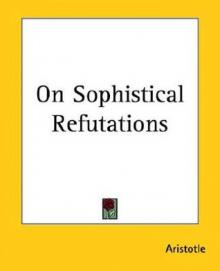 On Sophistical Refutations
On Sophistical Refutations The Categories
The Categories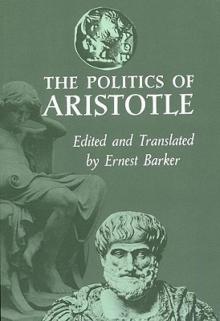 The Politics of Aristotle
The Politics of Aristotle Nicomachean Ethics
Nicomachean Ethics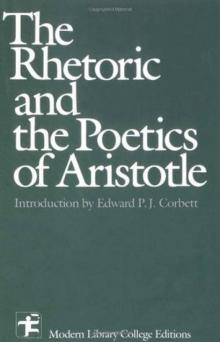 The Rhetoric & the Poetics of Aristotle
The Rhetoric & the Poetics of Aristotle POSTERIOR ANALYTICS
POSTERIOR ANALYTICS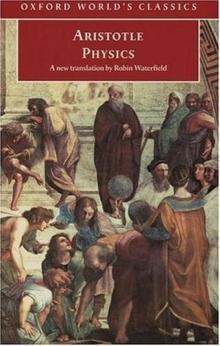 Physics
Physics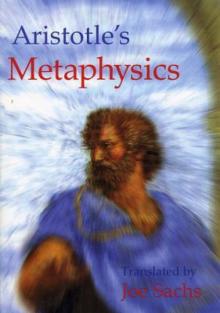 Metaphysics
Metaphysics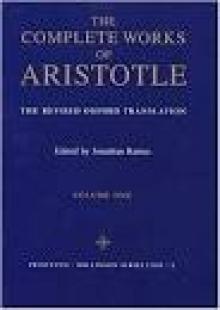 Various Works
Various Works